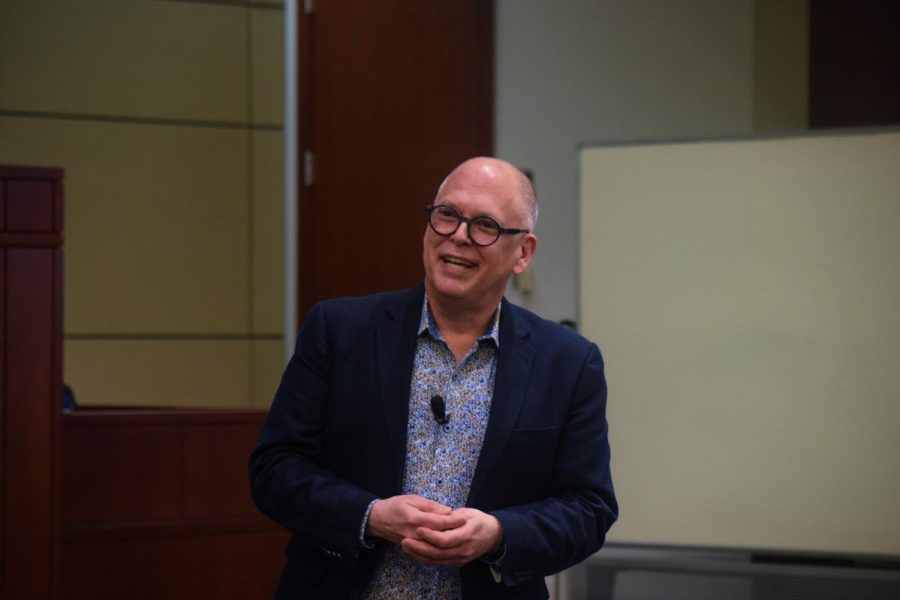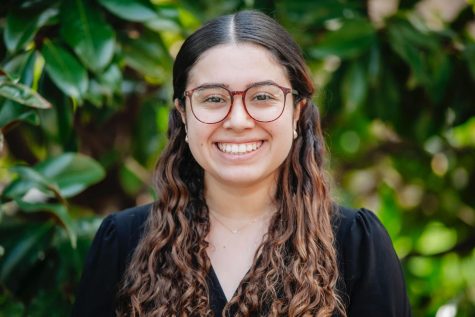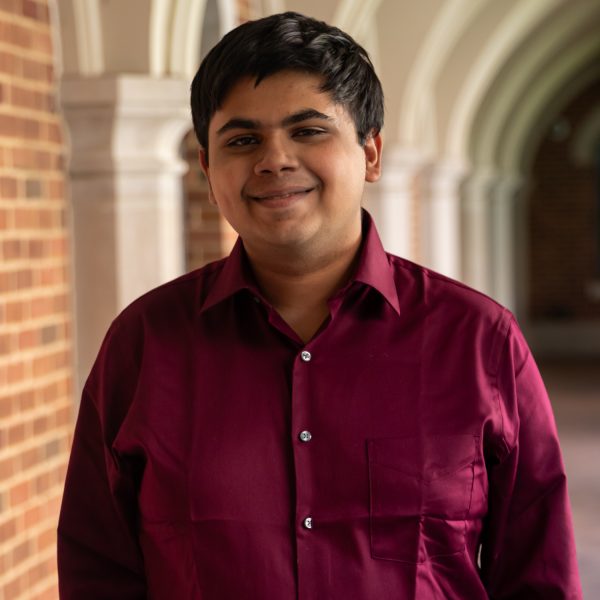Vanderbilt Law School hosted Jim Obergefell, the plaintiff in the 2015 landmark Supreme Court case that legalized same-sex marriage — Obergefell v. Hodges, on April 13. OutLaw, the Law Students for Social Justice, the Hyatt Fund, the George Barrett Social Justice Program, the Vanderbilt LGBTQ+ Policy Lab and the Office of Diversity, Equity and Inclusion co-hosted the event.
Obergefell began the event by discussing how he met his husband John Arthur. He spoke of Arthur’s subsequent diagnosis with amyotrophic lateral sclerosis, better known as ALS or Lou Gehrig’s disease, and how this condition motivated the couple to want to make their relationship official in the eyes of the state.
“He was more worried about my own well-being after his death than he was about himself,” Obergefell said.
Since same-sex marriage was prohibited in Ohio at the time, the couple flew to Maryland to get married in 2013. Obergefell said they soon realized their reality: As a same-sex married couple living in Ohio and with Arthur in his final few months of life, the state would refuse to recognize their married status on his death certificate. As a result, they filed a lawsuit against the state. Judge Timothy S. Black ruled in Obergefell and Arthur’s favor, granting a temporary restraining order that required Ohio to recognize their marriage on Arthur’s death certificate.
Obergefell then filed an amended complaint that added two additional plaintiffs to the case. Black again ruled in their favor, calling Ohio’s refusal to recognize same-sex marriages performed in other states as a violation of due process and equal protection. In response, the state appealed the case to the Sixth Circuit Court of Appeals.
The Sixth Circuit instead ruled in favor of Ohio, a decision the plaintiffs asked the Supreme Court to review. This request was then followed by 148 amici curiae briefs — among the most of any Supreme Court case. An amicus curiae, or “friend of the court,” brief offers information or expertise about a topic from a party uninvolved with the case itself. The court accepted the case on Jan. 16, 2015.
Though Ohio Department of Health Director Richard Hodges was listed as the defendant in the case, Obergefell added that he and Hodges are friends. He said his animosity about the situation was primarily directed at former Ohio Governor John Kasich and former Ohio Attorney General — who now serves as Ohio’s governor — Mike DeWine for their staunch opposition to marriage equality. He said he believes these men did not want their names associated with the case, causing Hodges to be the defendant.
Obergefell described the joy he felt when he had won the case, emphasizing that the effort had all been for his and Arthur’s love. As he began walking out, he said security prohibited them from exiting the building through the main entrance due to the sizable crowd of supporters.
“Come on, I just want to celebrate!” Obergefell remembered saying.
Obergefell also shared that he received a call from President Barack Obama shortly after the verdict was announced on June 26, 2015 — exactly 12 years after the Supreme Court struck down bans on sodomy in Lawrence v. Texas (2003) and two years after the Court struck down the Defense of Marriage Act in United States v. Windsor (2013).
“I never watch videos of myself, but this one, with a split screen of me and President Barack Obama, having a conversation, was one that I watched and was just thankful I didn’t butcher my words,” Obergefell said.
Yesha Yadav, Vanderbilt Law School associate dean and director of diversity, equity and community, said the Dean’s Lecture Series — of which this event was a part — is intended to promote understanding of fundamental civil rights movements and consideration of how these movements shape the Constitution, law and society.
“In inviting Mr. Obergefell, we were inspired by the opportunity to hear from someone who has been on the frontline of shaping one of the most transformative Supreme Court decisions for civil rights permitting LGBTQ+ individuals to gain marriage equality after essentially centuries of struggle, pain, and invisibility,” Yadav said.
Sophomore Lexi Abrams said she found the speaker event educational and inspiring.
“I didn’t really know much about the process of naming supreme court cases, so the speaker event with Mr. Obergefell was really illuminating when he explained how the process works,” Abrams said.
Junior Isabela Arcila said this event was exceptional compared to others she has attended.
“It was by far the best speaker event I’ve ever been to and probably ever will go to,” Arcila said. “Sure, hearing the law and logistic side of everything is important, but hearing the personal side made it even more impactful.”
Obergefell ended the Q&A portion of the event by calling on every student in attendance to use their voice to advocate for their beliefs.
“The best way to move forward is to use your voice. Speak up. I know expressing your opinion in a conversation when you don’t agree is challenging, but it is ultimately the most effective means of creating change,” Obergefell said.






